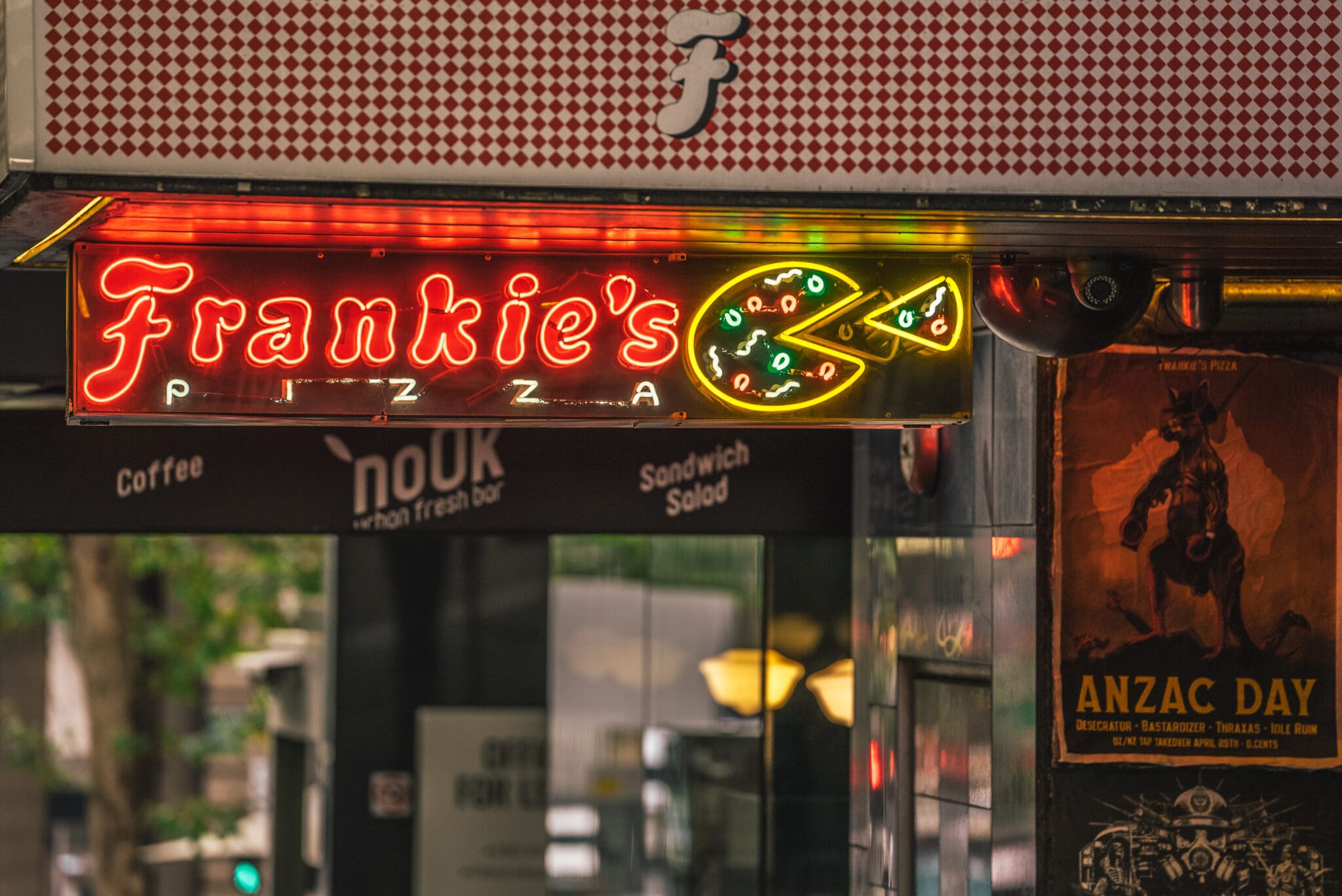It’s Thursday, early afternoon. A bar feigning as a pizza shop turns on its neon sign and ‘Frankie’s Pizza’ lights up the CBD. Seccies stand and chat at the door, faces aglow with red fluorescence. Outside the enclave of peeling posters and red carpet, commuters drip past, pushed on by the autumn downpour and promises of a hinted post-work pub endeavour.
It’s just another day of business as usual, but it might be one of the last. Frankie’s is set to be demolished this year to make way for the NSW Government’s Sydney Metro Station. The plan, valued at $26.6 billion and counting, will involve the underground destruction of Hunter Street and, with it, the bar that made a mundane city project the subject of widespread public bereavement.

Legend has it that ‘Frankie’ opens a family pizza joint, and when his nephew takes over he sets up a grunge bar in the back.
After all, this ending feels unfairly premature. When word of the bar’s impending closure went public last year, the outpouring of protest that followed felt justified. In just ten years of service, Frankie’s has death–circled, crowd–surfed, and stage-climbed its way to becoming a landmark on Sydney’s nightlife scene. From the New York pizza slices to the evolving line-up of craft beers, or simply the penchant for all things loud, rock, rogue, and unpretentious, Frankie’s has built a reputation for itself that feels decades old, with a unique brand of notoriety unrivalled by the most iconic dives in the city. Clearly, its closure will come too soon.
Yet for all the doom and gloom on a dreary Thursday, the bar staff aren’t wearing black because they’re in mourning. Characters quietly move around, rolling kegs across the floor, and fixing fallen fairy lights. In the daytime you can see even more expletives on the wall, if it were possible, and the staff disappear in and out of doors plastered with graffitied band posters. There’s no sadness, only work to do and another big night to prepare for.
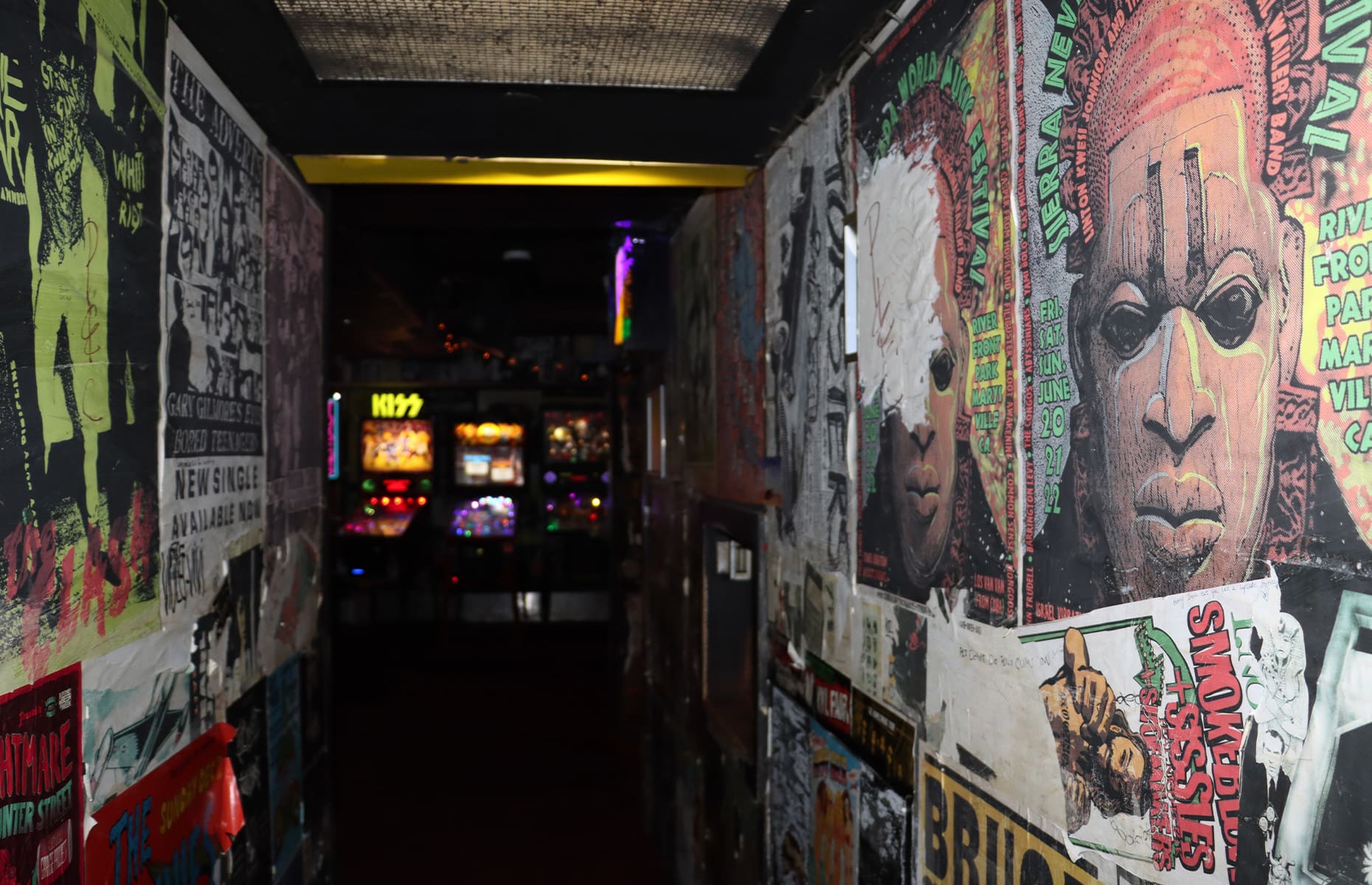
Every square inch has steadily been taken over by the public, featuring an ever-changing collection of graphic poetry, drunk advice, crude cartoons, and the occasional ‘was here’ – for now.
Jordan, we’re told, is the guy to speak to. He pulls a round of beer, shakes off the rain from running to re-park his car and settles into a round booth, someone lights a candle. “No one’s really feeling it’s a sinking ship. It’s more like a pride thing, riding it out to the end.” Jordan’s seen the most of Frankie’s colourful ten years. Questions of favourite nights or music acts quickly merge into ‘eras,’ defined first by the intoxicating days of the opening years, followed by a steady maturity, then COVID, and now a return to “that weird, surreal, drunk place” of yesteryear.
As owner, Jordan gives the final say on all the urban myths we ask him to validate. Yes, the Foo Fighters did take over the ‘secret’ speakeasy bathroom. No, David Grohl was only pouring Don Julio shots for people who happened to wander in there. And the bar’s origin story? “The entire concept was for it to feel lived in…something a little more romantic than the fact that it was just a total shithole.”

Jordan, we’re told, is the guy to speak to.
Legend has it that ‘Frankie’ opens a family pizza joint, and when his nephew takes over he sets up a grunge bar in the back. The nostalgia is constructed, only partly. The posters are twenty layers deep, all plastered up when the bar opened in 2012. Yet there’s no denying that Frankie’s has become an unceremonious gallery of sorts. Every square inch has steadily been taken over by the public, featuring an ever-changing collection of graphic poetry, drunk advice, crude cartoons, and the occasional ‘was here’ – for now.
Bar manager Em points to the walls behind the booth: “I’ve definitely written some pretty explicit things up on these walls,” she smiles, without going into any more detail.
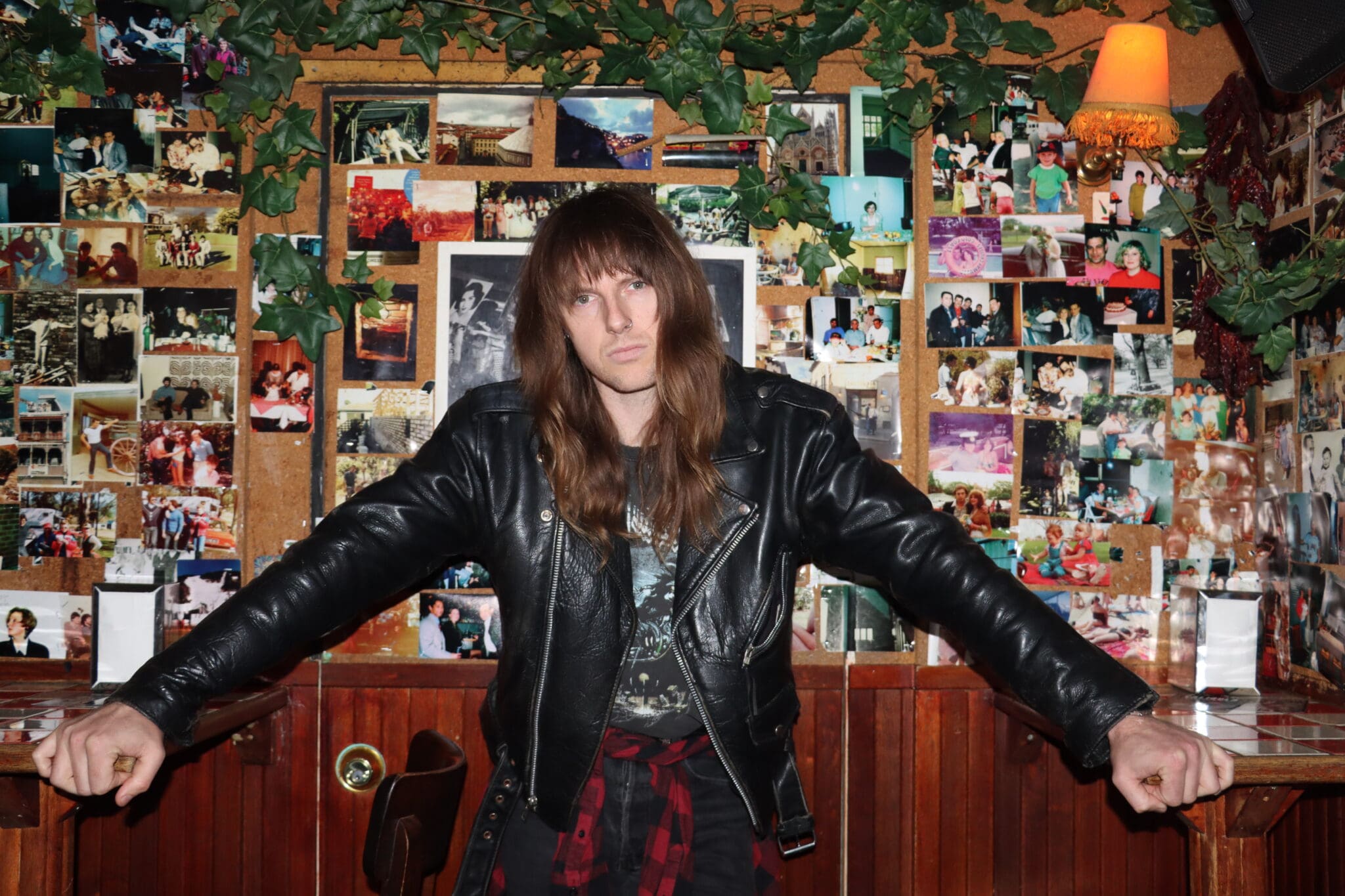
“You get the suits and the students, the queers, the freaks, the hippies. Metalheads and crust punks.”
What she is happy to talk about are the people: “You get the suits and the students, the queers, the freaks, the hippies. Metalheads and crust punks. Yeah, there’s not many places that are such a melting pot.” Clearly, the bar seems ripe for culture clash. Yet Em insists that beneath the tough exterior and all the tattoos, Frankie’s has been a space for people “that don’t really have a place in the world.”
It’s a tough point to argue against. On any given day you’ll find corporate types shoulder-to-shoulder with hardcore punks and diehard fans next to first-timers that have no clue who the band is. “It’s an island of misfit toys,” explains Callum, a bartender keen to take photos with the wax man behind the bar, sunnies perched between melted eyes. “I don’t even fucking know you guys but I’m sure you can feel this. I’ve never gone somewhere and been like, ‘Oh, I feel comfortable’ straight away.”
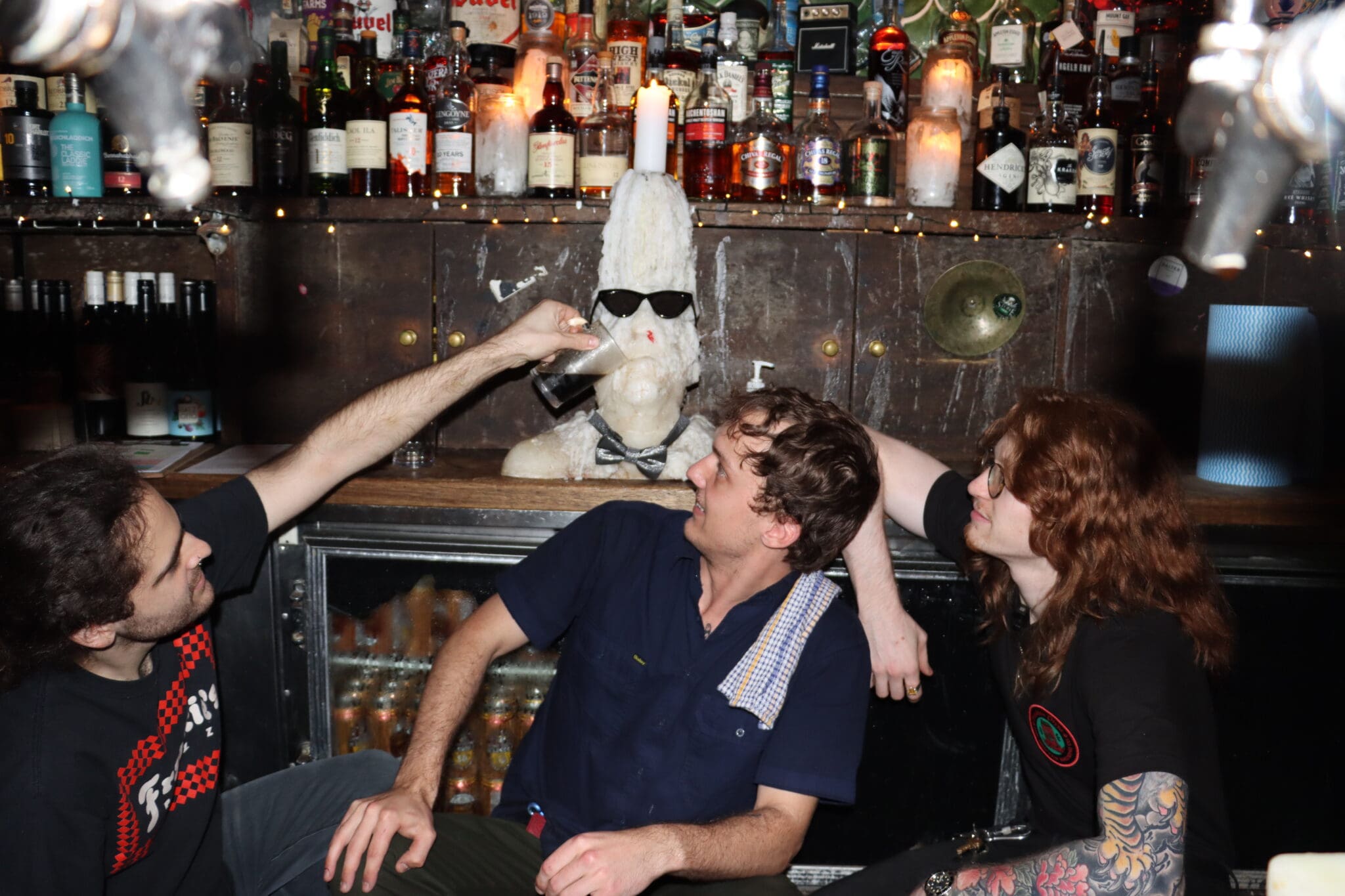
The bartenders keen to take photos with the wax man behind the bar, sunnies perched between melted eyes.
This acceptance of anyone (and anything) makes events like Freak Flag possible. “That was a fucking hit man,” laughs James, resident barback turned bartender and decided ‘character’ according to the staff. “It’s kind of like a celebration of alternative culture, a lot of weird things,” he treads cautiously, mindful to give a reasonably printable description of the event that happens once every month on an unspecified Sunday.
Another round of watermelon beer and the early crowd wanders in. It’s an assortment of backpacks, piercings, collared shirts and unruly, shoulder-length hair. Between more unmentionable stories about Freak Flag, which everyone provides plenty of, the lights dim and the music becomes characteristically loud. Everyone’s welcome, and according to Callum there are only two rules: “Just drink what you like and listen to what you like, it’s simple.”
That ‘simplicity’ will be hard to recapture when the bar closes this year, if government plans go ahead. Jordan describes their Hunter Street site as a “rare fucking beast,” thanks to its 24–hour license, coveted underground set-up, and capacity for large crowds,“I’m not positive it would translate to another space, but if an appropriate space did pop up, we’d leap all over it.”

Callum started off as a regular too until an old manager promised him a job.
News about final dates are also unclear, thanks to unsurprising delays in city scheduling. Jordan’s eyes wander around the room. “I’d love to know when it was going to end so we could plan for it…You know, bring back Prince from the dead.” For now the bar is staying open beyond its initial demolition date, previously set for mid-2022. There are plenty of uncertainties, but the staff are optimistic.
Em talks bittersweetly about when the news broke out, becoming unusually reverent. “Everyone came together and had this little crew meeting, and everyone huddled around in a big circle… Then it was like, alright, we’ve really got to make this count.” As conversation turns from the past to the future, it becomes clear that for the staff, there is a lot more to lose than just work.
“I am a little bit upset that my kid won’t see it,” Jordan says, “I was really looking forward to her growing up and knowing this was her bar or whatever, but it won’t be.”
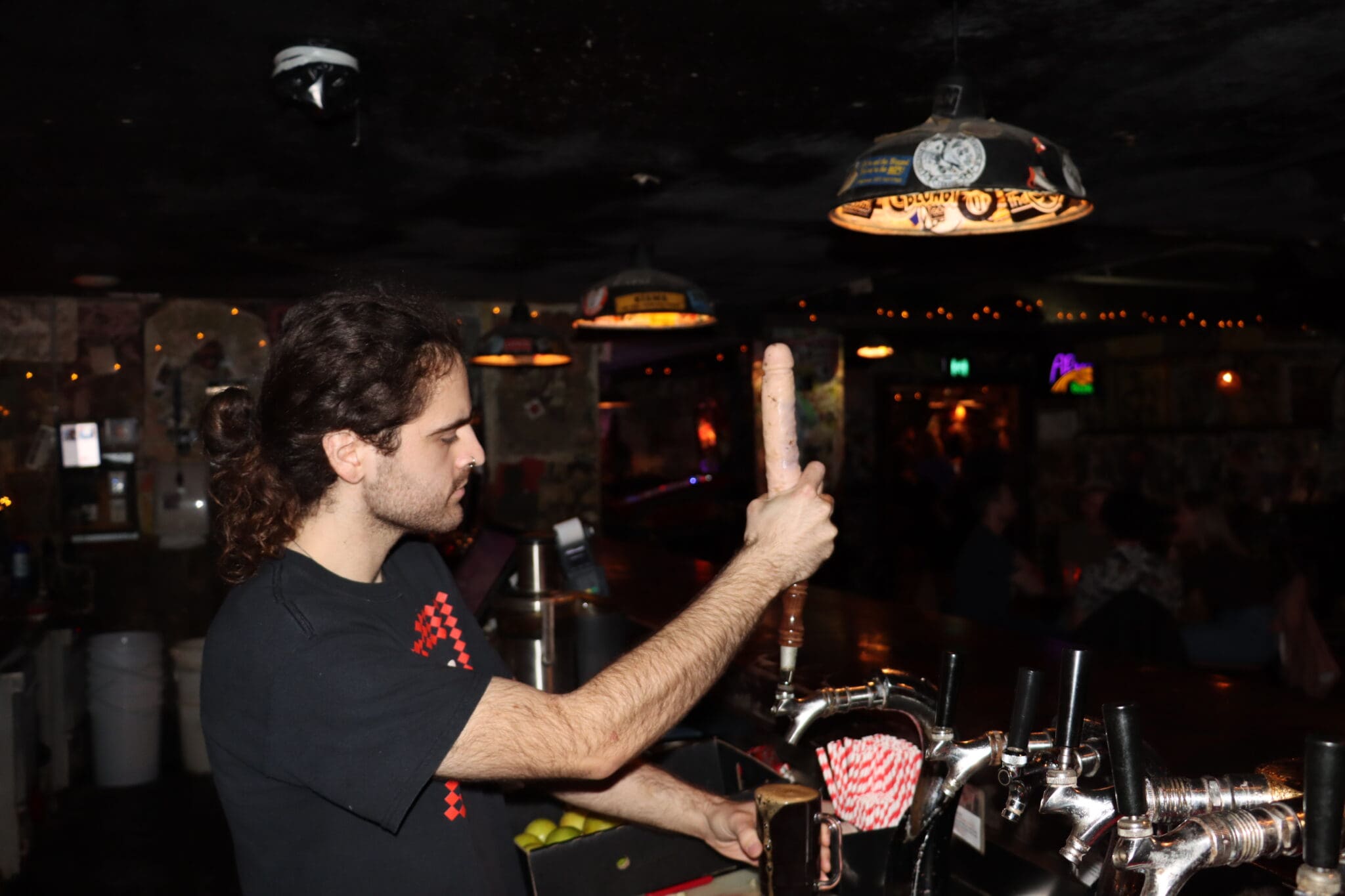
James (Coutz), resident barback turned bartender and decided ‘character’ according to the staff.
For James, Frankie’s closure will signal the end of an important chapter. He met his girlfriend and band members here, played their first gig on the hallowed Frankie’s stage, and got to feature with the long-admired house band. Callum started off as a regular too until an old manager promised him a job. “He said you seem like you make a fuck ton of money, but you hate what you do…if you’re that unhappy quit your job and I’ll make it work.” Three years later, he shows us around the secret speakeasy, recounting the “exact moment when [each staff member] helped and changed me personally. And I couldn’t repay them for it.”
It’s hard not to feel a little heartbreak, wondering what kind of chapter will close when the boards go up.
Yet if you wandered in from the street, lured by the glowing red pizza sign, you wouldn’t even know that Frankie’s is halfway to memory. One dollar pizza slices for happy hour, a jam-packed setlist for the months ahead, and by the sounds of things, a legendary send-off for when the curtain finally closes.
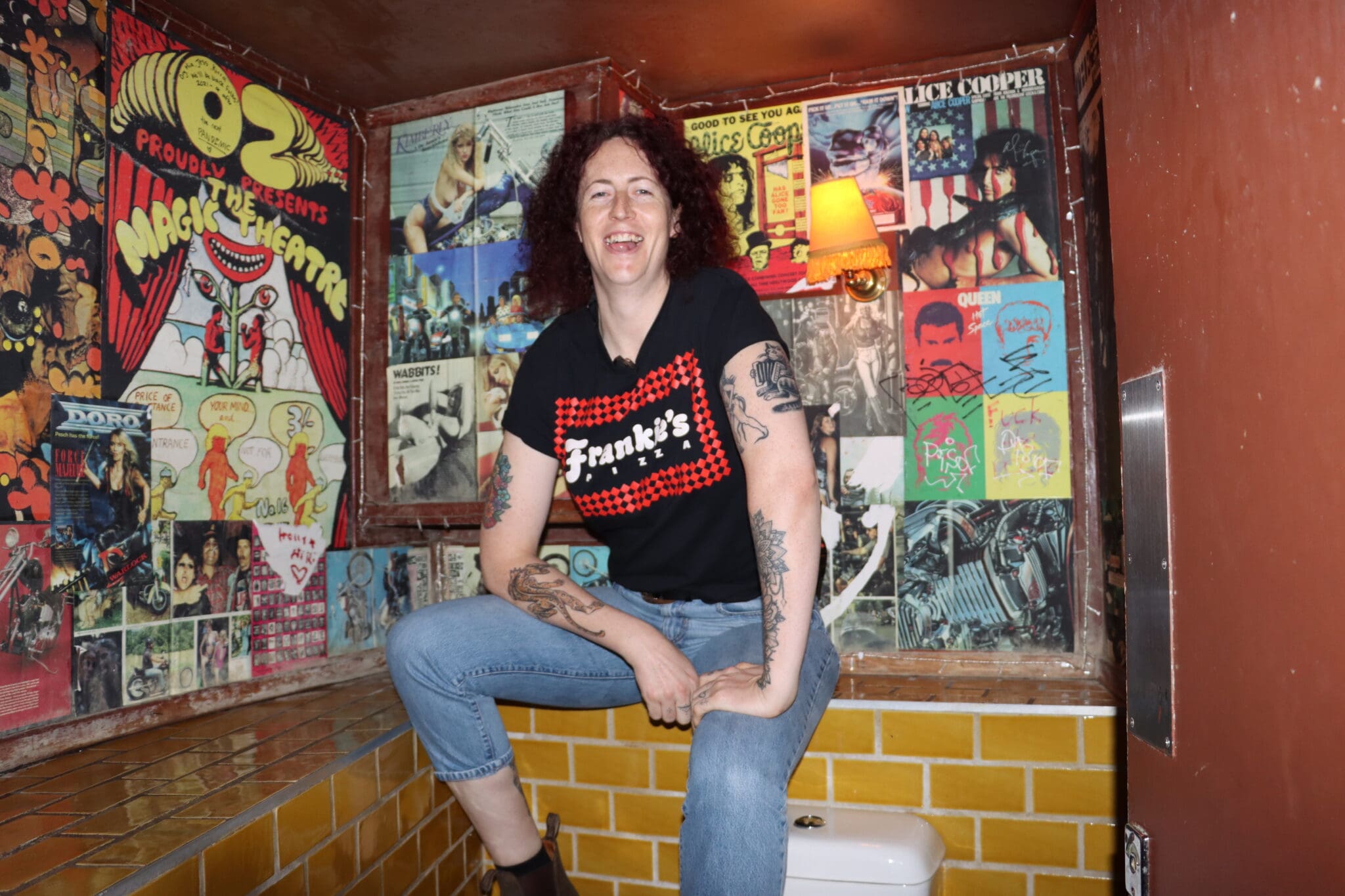
Em insists that beneath the tough exterior and all the tattoos, Frankie’s has been a space for people “that don’t really have a place in the world.”
Before the night kicks off, we ask Em to give us her eulogy for Frankie’s. She doesn’t disappoint.
“I guess it inspired and shaped a lot of people and not many venues do that. Not many venues have a true cultural impact aside from being cool places to just hang out. They don’t inspire the scene.” Em smiles at a poster somewhere across the bar.
“If you were there you were there…It was a place in time, and you really just had to experience it.”




